8A U8 Natural disasters知识点解读
初中英语译林版备课资料8AUnit 8 Natural disasters讲解分析+教案设计+习题设计+单元检测

Unit 8 Natural disasters单元概述单元教材分析:本单元围绕Natural disasters这个话题展开,让学生谈论了解各种自然灾难以及在各种自然灾难中如何自救,并注意从学生自己生活的实际环境出发,拓展了一些自然现象和自然灾害。
“Comic strip”部分通过Eddie和Hobo的对话情境,激发学生对本单元的学习兴趣,引出天气状况,同时初步导入本单元的重要语法——过去进行时。
“Welcome to the unit”部分通过对比自然灾难与人为事故来了解并掌握几种常见的自然灾难的名称,掌握句式:…if…和Was anyone hurt?等;“Reading”部分通过学习了解台湾地震幸存者Timmy的故事,了解台湾地震的基本情况,培养学生根据关键词和语境猜测大意的能力,学习并掌握大量的词汇、词组和句式,理解使用过去进行时的语境,同时培养学生根据已有的阅读材料抓住故事细节和故事情节发展的能力,引导学生运用正确的阅读技巧,全面提高阅读能力,教育学生在自然灾难中的自我保护。
“Grammar”部分介绍了过去进行时的构成和用法,学会“while”“when”和“as”在过去进行时中的具体运用;“Integrated skills”部分让学生通过听录音,从录音材料中提取信息,补全灾难预防提示表,并以“What should we do first?”让学生学会处理一些日常生活中的突发事故,训练学生的听、说、读、写技能;“Study skills”是英语构词教学中的一种,通过把两个独立的英语单词结合到一起构成另外一个单词,也就是“合成法”。
学生通过学会通过两个单词的意思,猜测出它们构成的新词的意思;“Task”部分通过回顾单元基础知识,学习在写作中陈述事实性信息,让学生根据一些要点完成Sandy 的范文,并根据范文设计出一种自然灾难文章的要点提纲,尝试写出相关文章。
训练学生的写作能力,综合运用英语的能力。
牛津英语8A Unit8 natural disasters 单元知识解析
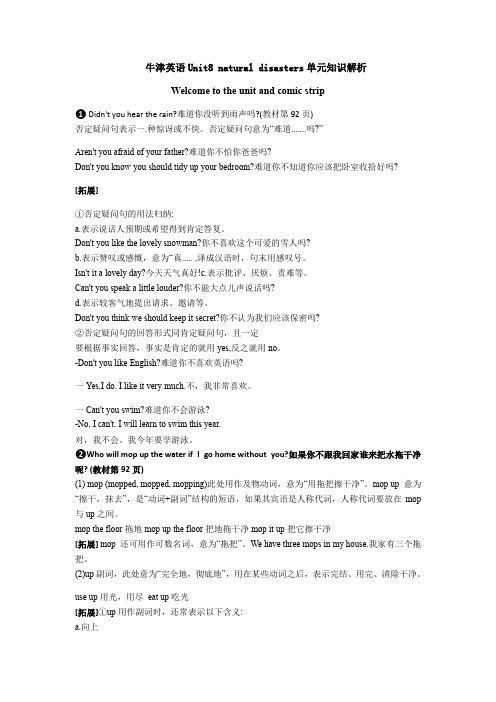
牛津英语Unit8 natural disasters单元知识解析Welcome to the unit and comic strip❶ Didn't you hear the rain?难道你没听到雨声吗?(教材第92页)否定疑问句表示一.种惊讶或不快。
否定疑问句意为“难道.......吗?”Aren't you afraid of your father?难道你不怕你爸爸吗?Don't you know you should tidy up your bedroom?难道你不知道你应该把卧室收拾好吗?[拓展]①否定疑问句的用法归纳:a.表示说话人预期或希望得到肯定答复。
Don't you like the lovely snowman?你不喜欢这个可爱的雪人吗?b.表示赞叹或感慨,意为“真..... ,译成汉语时,句末用感叹号。
Isn't it a lovely day?今天天气真好!c.表示批评、厌烦、责难等。
Can't you speak a little louder?你不能大点儿声说话吗?d.表示较客气地提出请求、邀请等。
Don't you think we should keep it secret?你不认为我们应该保密吗?②否定疑问句的回答形式同肯定疑问句,且一定要根据事实回答,事实是肯定的就用yes,反之就用no。
-Don't you like English?难道你不喜欢英语吗?一Yes,I do. I like it very much.不,我非常喜欢。
一Can't you swim?难道你不会游泳?-No, I can't. I will learn to swim this year.对,我不会。
我今年要学游泳。
❷Who will mop up the water if I go home without you?如果你不跟我回家谁来把水拖干净呢? (教材第92页)(1) mop (mopped, mopped, mopping)此处用作及物动词,意为“用拖把擦干净”。
8A Unit 8 Natural disasters知识讲解
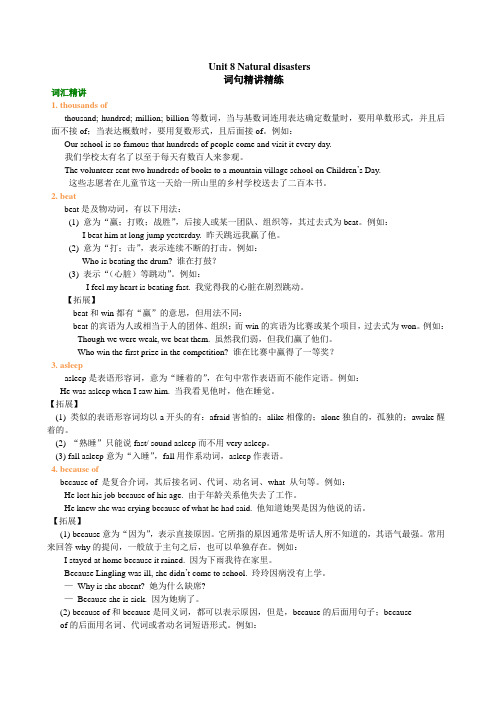
Unit 8 Natural disasters词句精讲精练词汇精讲1. thousands ofthousand; hundred; million; billion等数词,当与基数词连用表达确定数量时,要用单数形式,并且后面不接of;当表达概数时,要用复数形式,且后面接of。
例如:Our school is so famous that hundreds of people come and visit it every day.我们学校太有名了以至于每天有数百人来参观。
The volunteer sent two hundreds of books to a mountain village school on Children’s Day.这些志愿者在儿童节这一天给一所山里的乡村学校送去了二百本书。
2. beatbeat是及物动词,有以下用法:(1) 意为“赢;打败;战胜”,后接人或某一团队、组织等,其过去式为beat。
例如:I beat him at long jump yesterday. 昨天跳远我赢了他。
(2) 意为“打;击”,表示连续不断的打击。
例如:Who is beating the drum? 谁在打鼓?(3) 表示“(心脏)等跳动”。
例如:I feel my heart is beating fast. 我觉得我的心脏在剧烈跳动。
【拓展】beat和win都有“赢”的意思,但用法不同:beat的宾语为人或相当于人的团体、组织;而win的宾语为比赛或某个项目,过去式为won。
例如:Though we were weak, we beat them. 虽然我们弱,但我们赢了他们。
Who win the first prize in the competition? 谁在比赛中赢得了一等奖?3. asleepasleep是表语形容词,意为“睡着的”,在句中常作表语而不能作定语。
(完整版)8AUnit8Naturaldisasters知识点,推荐文档
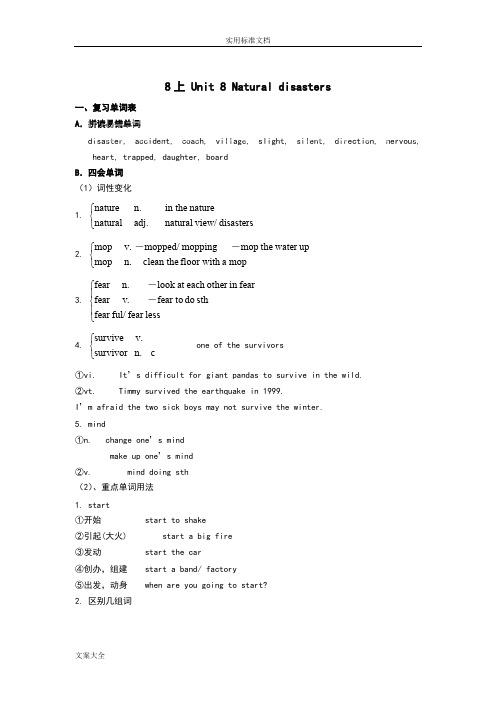
8上 Unit 8 Natural disasters一、复习单词表A .拼读易错单词disaster, accident, coach, village, slight, silent, direction, nervous,heart, trapped, daughter, boardB .四会单词(1)词性变化1. ⎩⎨⎧disastersview/ natural adj. natural naturein the n. nature 2. ⎩⎨⎧mopa floor with clean the n. mop up water the mop mopping mopped/ v.mop --3. ⎪⎩⎪⎨⎧less fear ful/ fear sthdo fear to .fear v fear in other each at look n.fear --4. one of the survivors⎩⎨⎧c n. survivor v.survive ①vi. It’s difficult for giant pandas to survive in the wild.②vt. Timmy survived the earthquake in 1999.I’m afraid the two sick boys may not survive the winter.5. mind①n. change one’s mindmake up one’s mind②v.mind doing sth(2)、重点单词用法1. start①开始start to shake ②引起(大火)start a big fire ③发动start the car ④创办,组建start a band/ factory ⑤出发,动身when are you going to start?2. 区别几组词a. b. ⎪⎪⎩⎪⎪⎨⎧live lively living alive ⎪⎪⎩⎪⎪⎨⎧excitement excitedly exciting excited/ excite c. d. ⎪⎪⎩⎪⎪⎨⎧oneself tell oneselftalk to oneself say to oneself ask ⎪⎪⎩⎪⎪⎨⎧down cut downfall down come down calm 3. ⎩⎨⎧foggiestfoggier/ adj.foggy n.fog -⎩⎨⎧ tomorrow.____________much be It will tomorrow._________much be will There 9. cover1)cover sth2)cover A with B3)be covered with4)be covered live4. ⎩⎨⎧n.arrival v.arrive What was the time of his arrival?When the vet arrived, the dog ⎩⎨⎧hour an half for dead been had died had 5. hurt-hurt/ hurt①vi.My back hurt.②vt.He hurt his left leg.③adj.be/ get (badly) hurt 6. ⎩⎨⎧-可与表否定的词连用用-不可与表否定的词连almost nearly ①nearly the same②He’s almost/ nearly as tall as me.③Almost nothing can prevent him going there.二、 重要词组、句型用法1. natural 词性__________ 意思是________e.g.自然灾害____________ 自然科学(n.)______ 意思是_______e.g. nature reserve 意思是_____________Milk is the __________food for young babies. 牛奶是婴儿的天然食物。
Unit8Naturaldisasters各部分单词短语句型讲义2023-2024学年牛津译林版八年
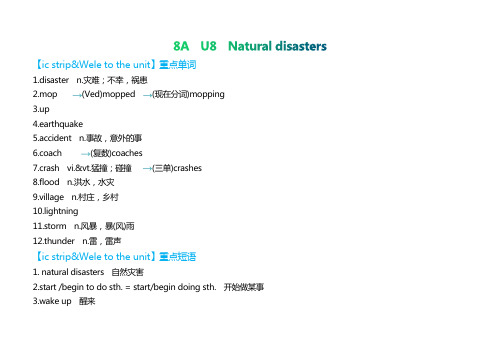
【ic strip&Wele to the unit】重点单词1.disaster n.灾难;不幸,祸患2.mop (Ved)mopped (现在分词)mopping3.up4.earthquake5.accident n.事故,意外的事6.coach (复数)coaches7.crash vi.&vt.猛撞;碰撞(三单)crashes8.flood n.洪水,水灾9.village n.村庄,乡村10.lightning11.storm n.风暴,暴(风)雨12.thunder n.雷,雷声【ic strip&Wele to the unit】重点短语1. natural disasters 自然灾害2.start /begin to do sth. = start/begin doing sth. 开始做某事3.wake up 醒来4.mop up 把......拖干净5.mop up the water 把水拖干净6.thousands of people 成千上万的人7.thousands of 成千上万的8.crash into 撞上9.wash away 冲走10.fall from ... 从...·落下11.hear about/of 听说12.what happened 发生了什么13.a heavy storm with thunder and lightning 一场雷电交加的大风暴14.catch fire 着火【ic strip&Wele to the unit】重点句型1. Didn't you hear the rain?难道你没听到雨声吗?2. Who will mop up the water if I go home without you? 如果你不跟我回家,谁将拖干水呢?3. Lightning hit a classroom building and it caught fire. 一幢教学楼被闪电击中而着火了。
8AUnit8知识点归纳
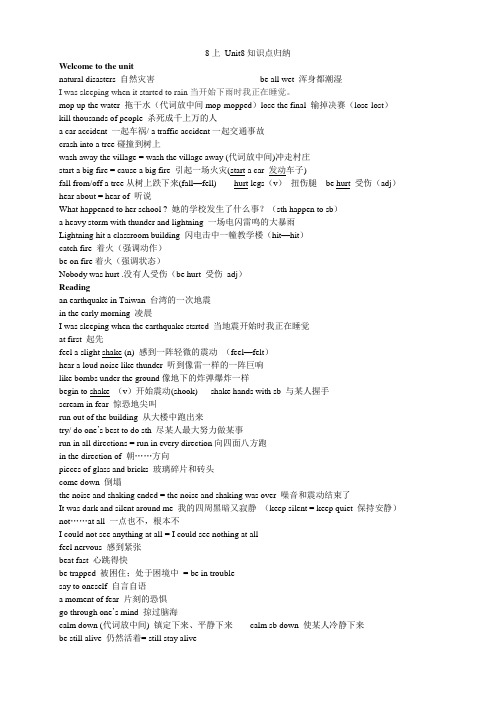
8上Unit8知识点归纳Welcome to the unitnatural disasters 自然灾害be all wet 浑身都潮湿I was sleeping when it started to rain当开始下雨时我正在睡觉。
mop up the water 拖干水(代词放中间mop-mopped)lose the final 输掉决赛(lose-lost)kill thousands of people 杀死成千上万的人a car accident 一起车祸/ a traffic accident一起交通事故crash into a tree碰撞到树上wash away the village = wash the village away (代词放中间)冲走村庄start a big fire = cause a big fire 引起一场火灾(start a car 发动车子)fall from/off a tree从树上跌下来(fall—fell) hurt legs(v)扭伤腿be hurt 受伤(adj)hear about = hear of 听说What happened to her school ? 她的学校发生了什么事?(sth happen to sb)a heavy storm with thunder and lightning 一场电闪雷鸣的大暴雨Lightning hit a classroom building 闪电击中一幢教学楼(hit—hit)catch fire 着火(强调动作)be on fire着火(强调状态)Nobody was hurt .没有人受伤(be hurt 受伤adj)Readingan earthquake in Taiwan 台湾的一次地震in the early morning 凌晨I was sleeping when the earthquake stsrted 当地震开始时我正在睡觉at first 起先feel a slight shake (n) 感到一阵轻微的震动(feel—felt)hear a loud noise like thunder 听到像雷一样的一阵巨响like bombs under the ground像地下的炸弹爆炸一样begin to shake (v)开始震动(shook) shake hands with sb 与某人握手scream in fear 惊恐地尖叫run out of the building 从大楼中跑出来try/ do one’s best to do sth 尽某人最大努力做某事run in all directions = run in every direction向四面八方跑in the direction of 朝……方向pieces of glass and bricks 玻璃碎片和砖头come down 倒塌the noise and shaking ended = the noise and shaking was over 噪音和震动结束了It was dark and silent around me 我的四周黑暗又寂静(keep silent = keep quiet 保持安静)not……at all 一点也不,根本不I could not see anything at all = I could see nothing at allfeel nervous 感到紧张beat fast 心跳得快be trapped 被困住;处于困境中= be in troublesay to oneself 自言自语a moment of fear 片刻的恐惧go through one’s mind 掠过脑海calm down (代词放中间) 镇定下来、平静下来calm sb down 使某人冷静下来be still alive 仍然活着= still stay aliveshout/scream for help呼喊求救pull oneself slowly through the dark 慢慢地向前移动通过黑暗Luckily, there was just enough space for me to move 很庆幸,刚好有足够的空间使我能够挪动find one’s way out 找到出路hear shouts from excited people 听到人们兴奋的叫喊声move away the bricks 搬走砖块(代词放中间)see the bright daylight 看见明亮的日光(shine brightly 明亮照耀)at last = finally = in the end 最后be asleep 睡着的–fall asleep 入睡,睡着—feel sleepy 感到瞌睡—the sleeping boy 正在睡觉的男孩Grammar and Integrated skillsWhat a terrible snowstorm ! 多么可怕的暴风雪啊!on the side of the road 在马路边wait for a taxi 等出租车break down 出故障,抛锚(break--broke)because of the cold weather 由于寒冷的天气because of (doing) sth 由于(做)某事(后接短语,而because后接一个句子)ring sb to come and help 打电话叫某人来帮忙hide behind a tree 躲在树后(hide—hid)get out as soon as possible 尽可能快地出去尽可能(2种)as soon as possible = as soon as sb canCover your mouth and noses with a wet towel to protect yourself from thick smoke用一条湿毛巾捂住你的嘴和鼻子来保护你自己免遭浓烟protect sb from……保护某人免遭……伤害stay low to the ground 贴着地面Never go back into the building on fire 不要返回到着火某的大楼Do not walk through the flood water 不要走过洪水Hide under a strong desk 躲在坚固的课桌下follow traffic rules 遵守交通规则ride your bicycle on railways 在铁路上骑自行车keep ourselves safe from traffic accidents 使我们自己安全免遭交通事故(keep sb safe from)stay away from a window 远离窗户deal with some accidents 处理一些事故burn our hands 烫伤我们的手put your hand in cold water 把手放入冷水put some cream on the burn 在伤口上涂上膏药Study skills and Taskon weekdays 在工作日have (got) a headache/ toothache头痛/牙痛The snow kept falling 雪一直下hear the wind blowing 听见风在吹lose my umbrella in the wind 在风中丢了伞nearly fall over 几乎跌倒walk slowly in the deep snow 在厚厚的雪地里慢慢地行走hear the noise of traffic 听见车辆的声音the next morning 第二天早上(用于一般过去时)clear the snow from the streets 清除街上的积雪A snowstorm hit Beijing on Friday,5 January .一场暴风雪在一月五日,星期五袭击了北京A strong wind come from behind 一阵大风从后面刮来。
牛津译林版8AUnit8 Natural disasters基础大归纳
牛津译林版8AUnit8 Natural disasters基础大归纳一.单词大击破1.disaster灾难; 不幸,祸患2. earthquake地震3. accident事故,意外的事4. flood洪水,水灾5. lightning闪电6. storm风暴, 暴(风)雨7. thunder雷,雷声8. bomb炸弹9.fear害怕,恐惧10. shaking摇动,震动11. shout呼喊,喊叫声12. burn烧伤,烫伤,灼伤13. crash猛撞;碰撞14. trapped困住的15. break损坏;打破16. clear清除,清理17. calm (使)平静,(使)镇定18. shake摇动,震动19. nervous紧张不安的20.beat (使)规律作响,作节奏运动二.短语大搜罗1. wake up醒来2. mop up the water用拖布把水擦干净3. thousands of成千上万的4. crash into 撞上5. wash away冲走6. hear about听说7. tell sb. about sth.告诉某人关于某事8. catch fire着火9. at night在夜晚10. at first起先,开始11. feel a slight shake感到轻微的晃动12. under the ground在地下13. in fear惊恐地14. run out of ...跑出来15. try one's best尽某人最大努力16. in all directions四面八方17. fall down掉下来18. come down崩塌,坍塌19. not...at all一点也不20. be trapped被困21. say to oneself自言自语,心里想22. calm down冷静23. shout for help喊救命24. find one's way out找到出路25. move away搬走,移开26. in danger处于危险中27. from side to side从一侧到另一侧28.up and down上上下下29. get on a bus.上公共汽车30. at last最后,终于31. break down ( 车辆或机器)出故障,坏掉32. because of因为,由于33. as..as possible尽可能......34. be on fire着火35. learn from .....学习36. stay away from ......37. cover it.. ......38. see the doctor看医生39. fall over跌倒40. heavy rain大雨三.用法大突破1. begin to do sth.开始做某事2.tell oneself to do sth. 告诉自己去做某事3.see sb. doing sh. 看见某人正在做某事4.Keep+宾语+形容词保持.....5.ask sb. to do sth.叫某人做某事6. have to do sth.不得不做某事。
新译林8AUnit8Naturaldisasters知识总结
8A Unit8 Natural disasters一.词汇拓展1.shak.v.→shakin.(n..摇.2.direc.v.→direction(n..方向3.liv.v.→aliv.(adj..活着的4.saf.adj.→safety(n..安全5.fear (n.) →fearful(adj.)可怕的、担心的二.重点短语1.was.awa.冲..was.代词away2.b.al.we.全湿了3.star.t.rai.开始下雨4.wak.u.醒.wake..u.wak.up+名词5.mo.u.th.wate.把水拖干净6.cras.int..tre.撞在树上7.star.bi.fir.引起大火8.fal.fro.th.tre.从树上掉下来9..heav.stor.wit.thunde.an.lightenin.伴有雷电的大暴雨10.catc.fir.着火11.in the early morning 在清晨12.feel a slight shake 感觉到轻微的晃动13.hear a loud noise like thunder 听到像雷声的噪音14.star.t.shak.开始摇. shak.hand.wit.sb.15.scream in fear 恐惧地尖叫16.ru.ou.o.th.buildin.跑出楼房17.try my best to run out 尽我所能的跑出18.begin to calm down 开始平静下来19.say to oneself 自言自语20.cal.dow.平静下来21.silen.silenc.silentl.安.寂静的22.no.a.al.一点也不23 find one’s way out 找到出路24.hea.abou.th.fir.听说火.hea.o. 听.hea.from收到...的来.25.Wa.anyon.hurt.有没有受伤? hur.v.adj.26.fea.v.fearfu.fearles.害..momen.o.fea.wen.throug.m.mind.一丝恐...掠过我的脑海。
牛津译林版八年级英语8AUnit8Naturaldisasters知识点复习
Unit8 Natural disasters知识点复习一.重点短语Welcome to the unit1.bring sb sth / bring sth to sb把某物带给某人bring me my clothes 把我的衣服拿来2.I bet you’ll look cool and feel cool with nothing on.我打赌你什么都不穿会看起来酷而且觉得凉快(betted) 3.It’s the best time to play football outside. 这是在外面踢足球最好的时候Reading4.A be full of B = A be filled with B A充满B、A里全是B;A被B填满5.forget to grow忘记生长6.forget /remember to do sth 忘记/记得要做某事(未做)forget/remember doing sth 忘记/记得做过某事(已做)7.fly far away飞往远方(fly—flew)The birds fly far away to find a warm and sunny day. 为了找到温暖而晴朗的日子,鸟儿飞向远方8.play among flowers在花丛中嬉戏9.hide from the April showers躲避四月的阵雨10.sweet memories of summer days夏日甜蜜的回忆11.what a perfect time to fly a kite ! 真是放风筝的好时节zy afternoon慵懒的下午13.by a pool 在池塘边14.autumn leaves( leaf) 秋天的落叶15.turn brown/ red变成褐色/红色16.fall into piles upon the ground落地成堆(fall—fell)fall on the ground落在地上17.harvest crops收割庄稼Farmers work to harvest crops as the days are shorter and the temperature drops.(a little/a lot/much)随着白天更短,气温下降,农民们忙着收获庄稼。
8A Unit Unit8 Natural disasters语法知识点讲解
8A Unit 8 Natural disasters语法知识点讲解[重点短语]1.be all wet全湿了2.come in进来3.come with me跟我来4.mop up the water把水拖干净5.lose the final输了决赛6.thousands of成千上万的7.wash away冲走8.fall from the tree从树上掉下来9.crash into撞到了10.hear about听说11.catch fire着火12.be hurt受伤13.feel a slight shake感到一阵轻微的震动14.in fear惊恐地15.run out of the building跑出了楼房16.try one's best to do sth.尽某人最大努力做某事17.in all directions四面八方e down崩塌,坍塌19.not at all一点也不20.feel nervous感到紧张21.say to myself自言自语22.a moment of fear片刻的恐惧23.go through my mind闪过我的脑海24.calm down冷静25.shout for help大声呼救26.pull myself slowly through the dark在黑暗中缓慢地爬动27find one's way out找到出路28.move away the bricks把砖块移走29.29.because of因为,由于30.30.at last最后,终于31.stand on the side of the road站在路边32.break down(车辆或机器)出故障,坏掉33.ring sb.(up)给某人打电话34.as...as possible尽可能……35.cover…with sth.用某物把……盖上36.protect yourself from thick smoke 保护你自己免受浓烟的伤害37.on fire着火了点38. on railways在铁路上39. keep ourselves safe from...保护我们自己安全不受……的伤害40. traffic accidents交通事故41. burn our hands烧伤我们的手42. keep falling(雪、雨等)不停地下43. hear the wind blowing听到风吹的声音44. in the wind在风中二【重点句型】1 Who will mop up the water if I go home without you? 如果你不跟我回家,谁将拖干水呢?2 There was a heavy storm with thunder and lighting. 有一场暴风雨,电闪雷鸣。
- 1、下载文档前请自行甄别文档内容的完整性,平台不提供额外的编辑、内容补充、找答案等附加服务。
- 2、"仅部分预览"的文档,不可在线预览部分如存在完整性等问题,可反馈申请退款(可完整预览的文档不适用该条件!)。
- 3、如文档侵犯您的权益,请联系客服反馈,我们会尽快为您处理(人工客服工作时间:9:00-18:30)。
8A U8 Natural disasters知识点解读
1. wake up 醒过wake sb. up 叫醒某人
e.g. I wake up at six every morning!我每天早上六点钟醒来。
She wakes me up at six every morning. 她每天早上六点钟叫醒我。
2. mop up 拖干净,把......拖干净
e.g. Hobo wants Eddie to mop up the water. Hobo想要Eddie把水拖干净。
3. thousands of 成千上万的e.g. There are thousands of people on the road.路上有成千上万的人。
4. a car accident 一场车祸e.g. There was a car accident yesterday.昨天有一场车祸。
5. crash into 猛撞,碰撞 e.g. A car crashed into a tree last night. 昨天晚上一辆车猛撞到一棵树上。
6. wash away 冲走e.g. A terrible flood washed away his house. 一场可怕的洪水冲走了他的房子。
7. fall from 从……掉下,落下e.g. The boy fell from a tree and hurt his legs. 那个男孩从树上掉下来伤到了他的腿。
8. catch fire 着火e.g. The house caught fire because of the lightening.因为闪电那个房子着火了。
9. feel a slight shake (n.) 感到一阵轻微的震动
e.g. We felt a slight shake when the earthquake started. 当地震开始的时候我们感到一阵轻微的震动。
10. start to shake (vt.) 开始摇动
e.g. The earth started to shake when the earthquake began. 当地震开始时地球开始摇动。
11. in fear 害怕地,恐惧地
相似的结构还有:
in trouble 有麻烦的in need 需要帮助的
in danger 处于危险之中in hunger 饥饿的
e.g. People screamed in fear. 人们害怕地尖叫起来。
e.g. They got lost in the forest. They had to try different ways in fear.
他们在森林里迷路了,他们不得不害怕地尝试不同的路。
12. run out of … 从……跑出 e.g. Some students run out of the classroom. 一些学生从教室里跑出来。
13. run in all directions 跑向四面八方e.g. People ran in all directions. 人们跑向四面八方。
14. come down 崩塌,坍塌e.g. The walls began to come down. 墙开始坍塌了。
15. feel nervous 感到紧张
16. beat fast 跳的快e.g. He felt nervous and his heart was beating fast.他感到紧张并且他的心跳的很快。
17. calm down 冷静下来,平静下来
calm v.使平静,使镇静n.平静,宁静adj. 平静的,镇静的
e.g. I’m nervous, but I told myself to calm down.我很紧张,但是我告诉自己要平静下来。
e.g. I must keep calm. 我必须要保持冷静。
18. find one’s way out 找到出路e.g. He wants to find his way out.他想要找到出路。
19. move away 搬走,移走e.g. They quickly move away the bricks. 他们快速的搬走了砖块。
20. as soon as possible 尽可能快e.g. She tries to get out as soon as possible.她试着尽可能快的出来。
21. cover your mouth and nose with a wet towel 用湿毛巾捂住你的嘴巴和鼻子
22. on railways 在铁路上e.g. Don’t ride your bike on railways.不要在铁路上骑自行车。
23. keep one’s safe from … 使某人的安全远离……
e.g. We must keep ourselves safe from fire.我们必须要使我们自己的安全远离火。
24. be on fire 着火e.g. The building is on fire.那栋大楼着火了。
25. stay away from … 远离……e.g. Please stay away from drugs. 请远离毒品。
重点语法:
1. 过去进行时主要表示:
■在过去某一时刻正在进行的动作
(a)They were eating breakfast at 7:00 a.m.yesterday.
(b)I was writing a letter at this time yesterday.
(c)Five minutes ago, Danny was looking out of the window and Suzy was reading a book.
■在过去某段时间一直在进行的动作
(a)From 1983 to 1998, he was teaching at Yale.
(b)They were building a dam last winter.
2. 过去进行时的句式
(1)基本结构:was / were + V-ing
(2)肯定句: 主语+was / were + V-ing
(3)否定句:was / were not + V-ing
was not = wasn’t
were not = weren’t
(4)疑问句:将was/were 调到主语前
(5)特殊疑问句:疑问词+was/were +主语+V-ing…
3. 当连接同时发生的两个延续性/长动作时,常用while引导。
e.g. While I was watching TV, he was listening to music.
Millie was reading a book while Eddie was sleeping.
4. 如果短暂性的动作是主句时,我们可以用when, while 或as 引导。
e.g. When/while/as Millie was watching TV, Andy came into the room.
5. 如果延续性的动作是主句时,我们经常用when 来连接。
e.g. Millie was watching TV when Andy came into the room.
6. 如果两个短暂性的动作同时发生,我们通常用as 连接。
e.g. As Millie sat down on the sofa, Andy came into the room.
注:当一个短暂性动作发生的同时伴随着一个延续性的动作,这时我们通常用过去进行时来表示延续性的动作,用一般过去时来表示短暂性的动作。
